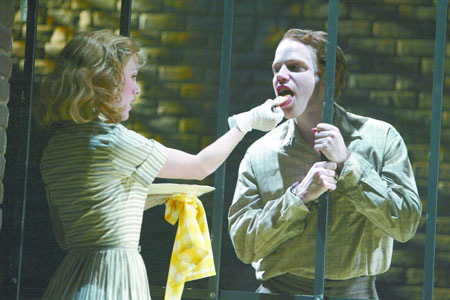Paul Rudnick pairs a mad Bavarian king and a Dustbowl queen
Call “Valhalla” the swish alternative to “Take Me Out.” The most talked about gay play of 2003 explored masculinity through the eyes of a gay baseball player and his butched-up teammates, while Paul Rudnick’s new gilded gay play examines similar issues through the eyes of a flaming gay king and his sexual renegade doppelganger.
It’s about time.
Rudnick, the uber-gay playwright behind the elaborately gay shows “The Most Fabulous Story Ever Told,” “Jeffrey,” and “Mr. Charles, Currently of Palm Beach,” is also a successful screenwriter, with credits including “Addams Family Values,” “In & Out,” and the upcoming remake of “The Stepford Wives,” starring Nicole Kidman. The man knows from gay.
In his latest comedy, Rudnick mines history in comparing and contrasting the lives of King Ludwig II, the 19th century ruler known as “The Mad King of Bavaria,” and the fictitious James Avery, a precocious teenager living in small-town Texas in the 1930s.
The comparison may seem odd, but through the lens of Rudnick’s lavender-colored glasses, once you find the gayness in everyone, everything makes sense. Ludwig was declared insane after bankrupting his treasury to build elaborate castles and grottoes. He also harbored an obsession with Wagner’s opera “Lohengrin,” and if Rudnick is to be believed, wore bows in his hair and slept with chorus boys.
James, on the other hand, is a kleptomaniac who sleeps with his best friend Henry Lee, with whom he shares a lifelong passion, wreaks havoc on his town, lands in jail, and earns the wrath of his family.
Rudnick uses his sharp tongue to find humor and pathos in these two queer transgressors, the fop and the outlaw. Although their worlds don’t intersect until play’s end, in an unnecessarily maudlin final moment involving a glass swan, Rudnick makes clear that had they lived at the same time, they probably would have been best friends.
Rudnick isn’t the most tactful of playwrights; the action often pauses to let a raunchy zinger rip––pick your target: the church, straight people, Jews. But along with the sight gags and also the very queer humor there is a real heart, one that revels in same-sex love and suggests that the world might be a better place if gay men were in charge.
At a time when the world conspires to squelch gay men’s sensibility––with same-sex marriage battle lines drawn––Rudnick magically makes it clear that gay men will persist in rising above the bigotry with a spirit and moral clarity that outshines that which passes for family values.
It’s an argument that gay writers have often made in the past, but one that can never be made too often, especially since in Rudnick’s hands it’s as hysterically sacrilegious and sex-obsessed as you can get.
Director Christopher Ashley allows the jokes to do what they do best––make the audience laugh. Only toward the end of the second act, when Rudnick’s writing strays into sappy territory, does the pace lag.
With one exception, the show is perfectly cast. With eyes rolling and limbs aflutter, Peter Frechette brings a deliciously queeny humanity to King Ludwig. The dangerously handsome––and at one point totally, wonderfully naked––Scott Barrow brings energy to the role of Henry Lee; he’s the perfect companion, physically and emotionally, to Sean Dugan’s sly James. In their various roles, Candy Buckley and Jack Willis use crack comedic timing to great effect.
However, Samantha Soule, who plays most of the young female roles, including Henry Lee’s fiancée, doesn’t have the darker qualities her characters call for. Someone less traditionally pretty and pleasant––“Saturday Night Live”’s plain-Jane Rachel Dratch comes to mind––would have brought more complexity and clowning to these sad-sack characters.
So much gay theater today is either too political, where a message about “tolerance” gets bogged down in dreadful writing, or aggressively sexual, where the point is merely to titillate audiences with flashes of flesh. Despite the craziness on stage––from a jousting match to a conga line to a musical interlude––this play lands gracefully in the middle, with meaning.
When Ludwig announces, “I’m not good at reality, but I’m brilliant at everything else,” you can’t help but think that he’s speaking for many gay men who have sought refuge in a city like New York, where their creativity and eccentricities are not only tolerated but also embraced.
When you’re too weird or too artistic or just plain too flaming for Ohio and its humdrum realism, like “Valhalla,” New York in all its splendor can be your big gay castle.


































